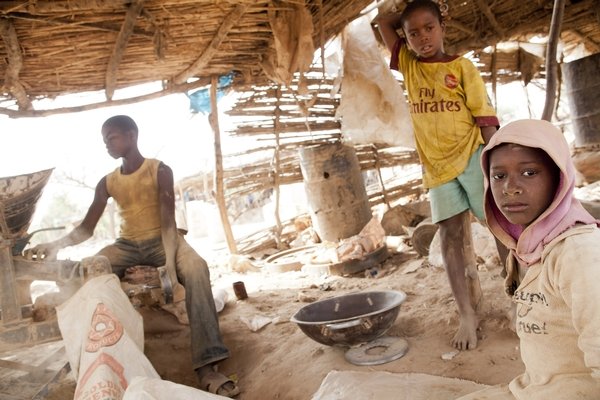Nigeria: Zamfara lead poisoning crisis

May 14, 2012
An international conference to find solutions to the Zamfara lead poisoning crisis* in Nigeria, of which Médecins Sans Frontières (MSF), was the lead organiser concluded on 10th May. The conference delegates endorsed a clear action plan calling for Nigerian government commitment to resolve the crisis.
“There has been plenty of talk, but now is the time for action” said Ivan GAYTON, MSF Country Representative in Nigeria. “MSF will consider this conference to be a success when all of the poisoned children are living in a safe environment and receiving treatment.”
Delegates including Zamfara state ministers, HRH the Emir of Anka, Nigerian government representatives as well as national and international aid workers, scientists, health, environmental and mining experts expressed disappointment that the decision-makers from the Nigerian government; the ministers of Mines, Environment, and Health, were not present - and that no concrete action by the Nigerian federal government was announced.
Most urgently the promised funds of 850 million Naira (US$ 5.4 million) for environmental remediation and safer mining that have been languishing for months, while thousands of children continue to suffer from acute lead poisoning, must be released without further delay to the people of Zamfara.
The Conference agreed an Action Plan to set the path to achieving the three key pillars necessary to solve the Zamfara crisis – medical care; environmental remediation and safer mining. To succeed the Nigerian government, in particular the ministries of Mines, Environment, and Health at both federal and state level must commit significant resources and coordination.
Release of the promised funds is a key priority of the Action Plan, as is the immediate remediation of the village of Bagega where an estimated 1500 children have been suffering from lead poisoning since 2010, and continue to wait for their village to be made safe. MSF cannot provide effective treatment in locations such as Bagega, which have not been remediated. MSF treats the sickest children at its inpatient facility in Anka hospital.
“The people of Bagega are desperate for help.” said Zakaria MWATIA, a nurse and project coordinator for MSF in Zamfara. “Some of the villagers are attempting to remediate their own compounds in hopes that MSF will be able to provide treatment.”
“To effectively cut the pathways of lead contamination requires specialised expertise and equipment” said Simba TIRIMA, said Simba Tirima, a scientist with an environmental engineering firm. The people of Bagega need the urgently required assistance to provide a safe environment for their children.”
* In March 2010 an unprecedented lead poisoning crisis was discovered in Zamfara State, northern Nigeria, an estimated 400 children died.
“There has been plenty of talk, but now is the time for action” said Ivan GAYTON, MSF Country Representative in Nigeria. “MSF will consider this conference to be a success when all of the poisoned children are living in a safe environment and receiving treatment.”
Delegates including Zamfara state ministers, HRH the Emir of Anka, Nigerian government representatives as well as national and international aid workers, scientists, health, environmental and mining experts expressed disappointment that the decision-makers from the Nigerian government; the ministers of Mines, Environment, and Health, were not present - and that no concrete action by the Nigerian federal government was announced.
Most urgently the promised funds of 850 million Naira (US$ 5.4 million) for environmental remediation and safer mining that have been languishing for months, while thousands of children continue to suffer from acute lead poisoning, must be released without further delay to the people of Zamfara.
The Conference agreed an Action Plan to set the path to achieving the three key pillars necessary to solve the Zamfara crisis – medical care; environmental remediation and safer mining. To succeed the Nigerian government, in particular the ministries of Mines, Environment, and Health at both federal and state level must commit significant resources and coordination.
Release of the promised funds is a key priority of the Action Plan, as is the immediate remediation of the village of Bagega where an estimated 1500 children have been suffering from lead poisoning since 2010, and continue to wait for their village to be made safe. MSF cannot provide effective treatment in locations such as Bagega, which have not been remediated. MSF treats the sickest children at its inpatient facility in Anka hospital.
“The people of Bagega are desperate for help.” said Zakaria MWATIA, a nurse and project coordinator for MSF in Zamfara. “Some of the villagers are attempting to remediate their own compounds in hopes that MSF will be able to provide treatment.”
“To effectively cut the pathways of lead contamination requires specialised expertise and equipment” said Simba TIRIMA, said Simba Tirima, a scientist with an environmental engineering firm. The people of Bagega need the urgently required assistance to provide a safe environment for their children.”
* In March 2010 an unprecedented lead poisoning crisis was discovered in Zamfara State, northern Nigeria, an estimated 400 children died.





Leave a Comment